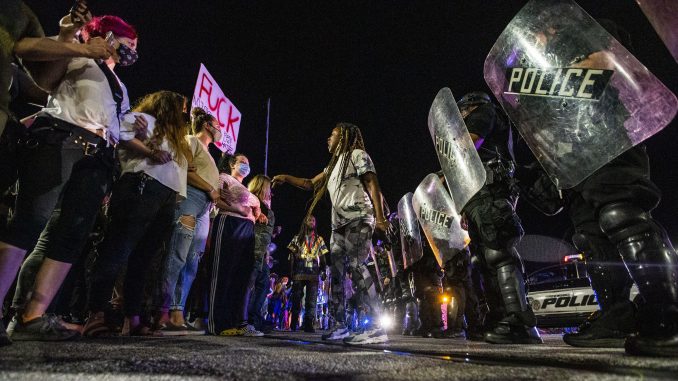
RALEIGH — North Carolina’s capital city enacted a curfew Monday after two nights of protests over the latest killing of a black man by police led to street fires, store break-ins, and fireworks thrown at officers.
Raleigh Mayor Mary-Ann Baldwin said in a statement that the curfew will run each night from 8 p.m. to 5 a.m. until she decides to rescind it. Except for medical emergencies and certain professions, curfew-breakers face a misdemeanor charge and a fine.
“By setting a curfew, my hope is that this will allow our community to pause, collect ourselves, begin to repair the damage and turn our focus to the important work of finding connection and commonality,” Baldwin said.
In Greensboro, where businesses were also damaged, Mayor Nancy Vaughan announced a similar curfew from 8 p.m. until 6 a.m. Fayetteville’s mayor previously enacted a curfew.
The National Guard was deployed in Raleigh after Gov. Roy Cooper, a Democrat, announced Sunday that hundreds of Guardsmen were available to cities that requested them.
On Monday night as a group was peacefully demonstrating outside the executive mansion, Cooper walked out briefly among the protesters and said, “I want to thank you all for being here,” according to a video posted on Twitter by WNCN-TV.
The curfew comes after Raleigh protests Sunday included confrontations with police who used tear gas. As protesters dispersed, roving groups smashed windows at businesses and set fires in garbage cans and on sidewalks. They also defaced a large Confederate monument on the old state house grounds with obscenities and the initials of the Black Lives Matter movement.
Demonstrators angry over the death of George Floyd in Minneapolis confronted officers in riot gear at the old state capitol, then marched to the governor’s mansion and other parts of downtown. Officers in tight formation and wielding long clubs pushed the crowd along, firing tear gas and flash bang grenades to clear the streets.
The protests over Floyd’s death last week have spread to cities and communities around the U.S. The handcuffed black man had pleaded for air as a white Minneapolis police officer pressed his knee against Floyd’s neck for several minutes. The officer has since been charged in the death.
“It just keeps going. There’s something new every single day. Every single day. Every single day. We haven’t got over the last murder, because there was probably one today,” said Paris Harper of Goldsboro, who walked up and down a line of officers in riot gear. “And there’s going to be one tomorrow, and there’s going to be one the next day.”
In Charlotte, more than 15 demonstrators were arrested during protests Sunday night, the city’s police department said in a Twitter post. Charlotte police said four of the arrests were for assaulting officers, including one person accused of hitting an officer with a rock. Three others were arrested on illegal weapon charges, police said.
The North Carolina chapter of the American Civil Liberties Union criticized the tear gas and rubber bullets used by police such as in Raleigh, saying that only compounded “the suffering and grief gripping our black and brown communities.”
House Speaker Tim Moore, who keeps an apartment in downtown Raleigh and was there over the weekend, criticized Cooper on Monday for failing to use the National Guard more aggressively to discourage property damage. Moore said he noticed flags associated with left-wing extremist groups, indicating outside troublemakers were trying to take advantage of peaceful protesters speaking out about injustice.
“Their legitimate protest and concerns were hijacked,” he said.
Cooper spokesperson Dory MacMillan said the governor fulfilled mayors’ requests for law enforcement assistance, including the National Guard. Charlotte also had requested help from the guard, as did Fayetteville and Greenville, she said.
“While we must ensure the important call for change isn’t lost amidst escalating tensions, violence and destruction are unacceptable and must stop,” MacMillan wrote in an email.



